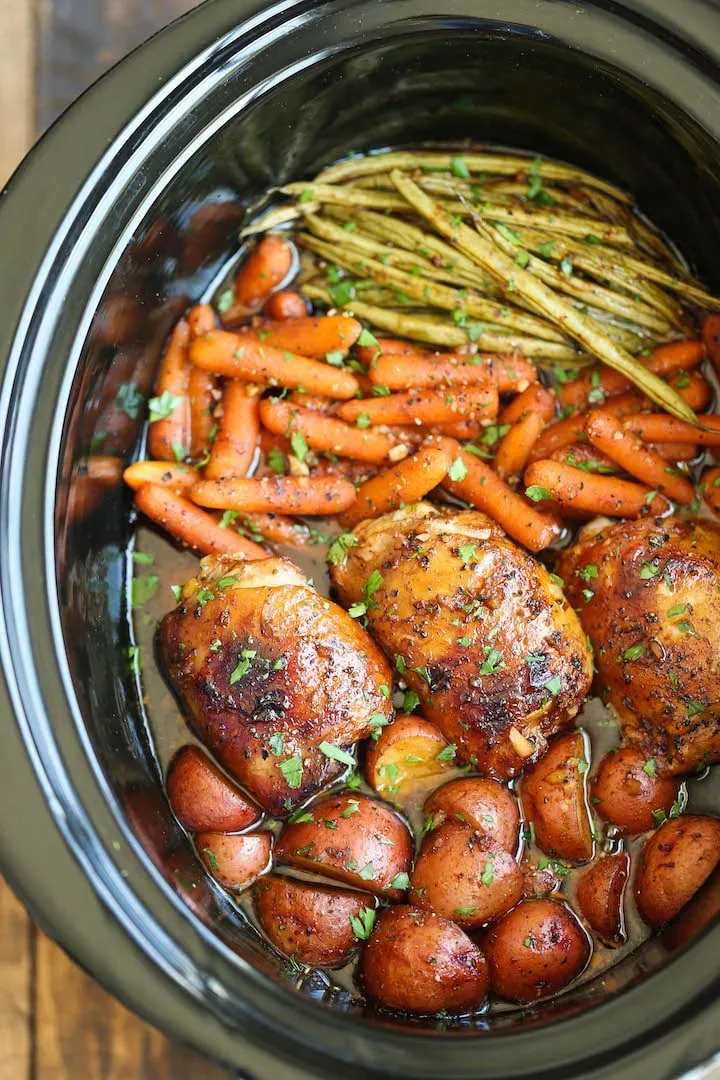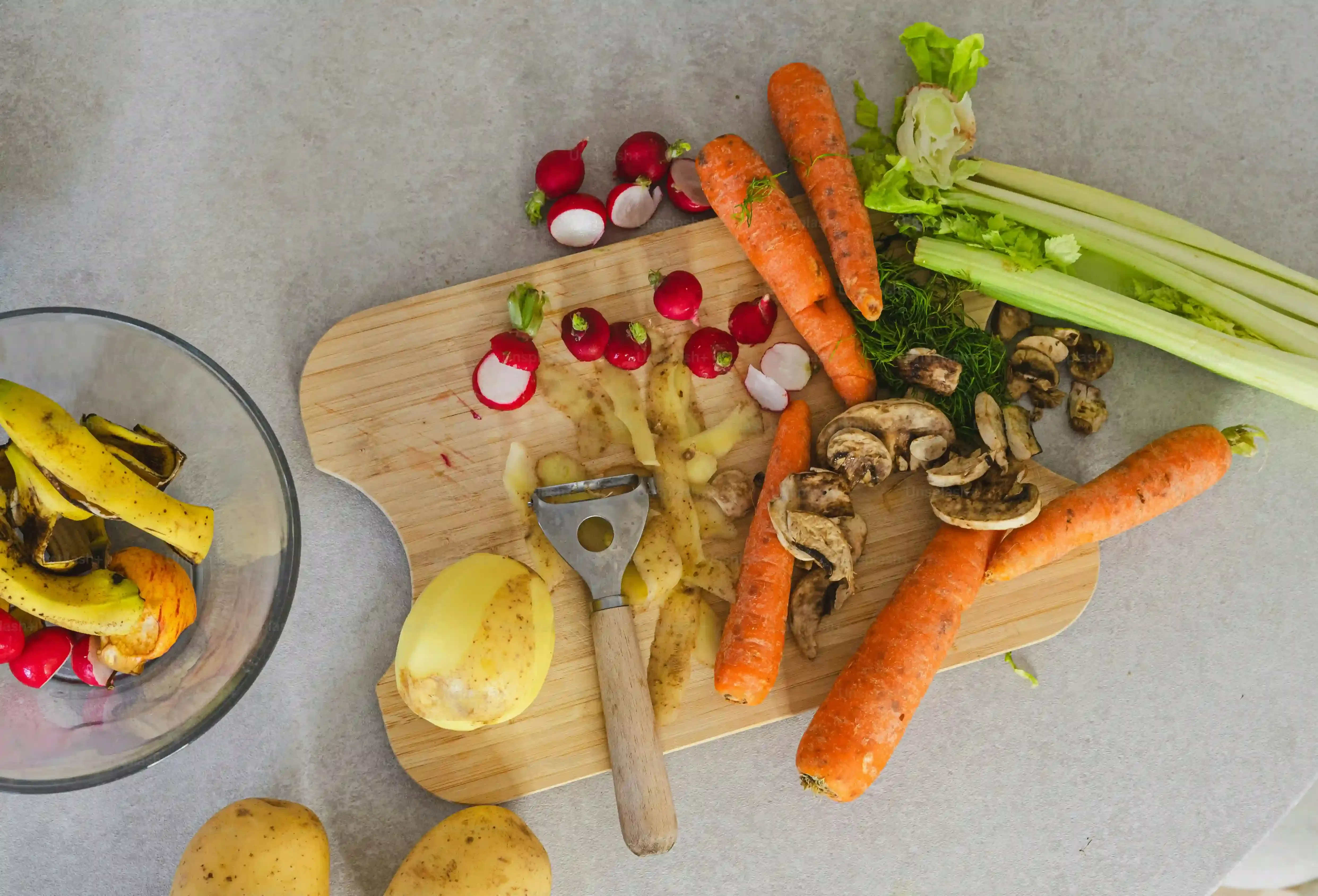Table of Contents
Weeknights arrive like a freight train, often leaving you scrambling for dinner ideas that don't involve excessive time or questionable nutritional value. You want something easy, sure, but you also want food that actually fuels you, not just fills a plate. This is where the humble slow cooker steps in, promising convenience. But can it really deliver on the "healthy" part without tasting like bland, watery disappointment? Absolutely. Figuring out how to make genuinely good slow cooker healthy dinner recipes can feel like navigating a culinary minefield, especially when you're tired and hungry. You've likely seen the glossy photos, but does the reality match the expectation?
Unlock Flavor & Health: Why Slow Cooker Meals Are Your Weeknight Win

Unlock Flavor & Health: Why Slow Cooker Meals Are Your Weeknight Win
Beyond Boiling: Building Deep Flavor Effortlessly
Let's be honest, many folks eye the slow cooker with suspicion, picturing bland, gray mush. And yeah, if you just dump things in without thought, you might get that. But the magic of low and slow cooking is how it coaxes flavor out of ingredients. Think about those tough cuts of meat that turn into melt-in-your-mouth perfection or how spices bloom and meld over hours. It's not just about cooking food; it's about developing complexity without standing over a hot stove. You can toss in tougher, cheaper cuts of protein, which often have more flavor anyway, and the slow, moist heat breaks down connective tissues beautifully. Vegetables soften and release their sweetness, and liquids reduce just enough to concentrate tastes. It's flavor development on autopilot while you navigate the chaos of a Tuesday evening.
Keeping the Good Stuff In: Slow Cooking for Health
Now, about the "healthy" part of slow cooker healthy dinner recipes. Unlike boiling where nutrients can leach out into the water you eventually drain away, slow cooking keeps everything contained. Vitamins and minerals stay put in the pot, right where you want them – in your food. Plus, the forgiving nature of the slow cooker means you don't need excessive amounts of added fat for things to cook properly or taste good. You can rely on the natural juices and a little bit of healthy oil or stock. It makes incorporating lean proteins, legumes, and a mountain of vegetables ridiculously easy. It’s a straightforward way to control exactly what goes into your meal, ditching the mystery ingredients often found in processed foods or takeout.
Here are a few ways slow cooking helps keep things healthy:
- Requires less added fat compared to searing or frying.
- Nutrients are retained within the pot, not lost in cooking water.
- Ideal for cooking lean proteins until tender without drying them out.
- Makes it easy to pack in lots of fiber-rich vegetables and legumes.
- Allows precise control over salt and sugar content.
The Ultimate Weeknight Weapon: Time and Stress Saved
so flavor and health are covered. But the real win, the reason most of us even own these things, is the sheer convenience. Picture this: spend 15-20 minutes in the morning or the night before doing some basic chopping and assembly. Toss it all into the slow cooker. Turn it on. Walk away. Come back hours later to a fully cooked, hot meal ready to eat. No last-minute panic, no frantic chopping while everyone's hungry. It’s a dinner that practically makes itself while you tackle emails, help with homework, or just sit down for five glorious minutes. This hands-off approach is a game-changer for busy weeknights, transforming dinner from a dreaded chore into something manageable, even enjoyable. That's the undeniable appeal of slow cooker healthy dinner recipes – they give you back precious time.
Simple Slow Cooker Healthy Dinner Recipes to Get Started

Simple Slow Cooker Healthy Dinner Recipes to Get Started
Alright, so you're sold on the concept – less stress, more flavor, more nutrients. But where do you actually begin with slow cooker healthy dinner recipes without feeling overwhelmed? You don't need to attempt some seven-layer gourmet stew on your first go. Start simple. Think recipes with minimal ingredients that don't require elaborate prep or fancy techniques. Chicken is usually a good entry point; it's forgiving and cooks beautifully in a slow cooker. Or perhaps a hearty lentil soup or a bean chili. These types of dishes are hard to mess up, and they build confidence while delivering genuinely healthy, satisfying results. The goal here is momentum, getting one or two successful slow cooker meals under your belt so you see that this isn't some mythical cooking method, but a practical tool for real people.
Diving Deeper: More Mouthwatering Slow Cooker Healthy Dinner Recipes
Branching Out: Beyond the Basic Chicken and Chili
Once you've mastered the simple stuff – the chicken breasts that shred like a dream, the forgiving bean chili – it's time to expand your slow cooker healthy dinner recipes repertoire. This doesn't mean suddenly tackling Beef Wellington (please, don't), but it does mean exploring different proteins, cuisines, and structures. Think about pulled pork using a lean cut like pork tenderloin and a vinegar-based sauce instead of sugary BBQ. Or maybe a fish stew, though you add the fish towards the end so it doesn't disintegrate into sad flakes. You can even do things like lasagna, layering noodles, lean ground turkey or lentils, and plenty of hidden veggies. The slow cooker excels at infusing flavor into ingredients that might otherwise be a bit plain, making it perfect for healthier versions of comfort food classics.
Exploring Global Flavors and Dietary Needs
The slow cooker isn't just for American comfort food. It's a fantastic tool for adapting healthy global slow cooker healthy dinner recipes. Indian curries, Moroccan tagines, even certain Thai dishes can work beautifully, allowing spices and aromatics to deepen over hours. Lentils and chickpeas become incredibly tender, absorbing all those complex flavors. For those navigating dietary restrictions, the slow cooker is a lifesaver. Vegan stews and chilis are incredibly easy to make hearty and flavorful. Gluten-free grains like quinoa or brown rice can be added towards the end of cooking (or cooked separately) to round out a meal. It's about seeing the slow cooker not just as a convenience appliance, but as a versatile vessel for creating diverse, healthy meals that fit your lifestyle and keep your taste buds interested.
Thinking about branching out? Consider these slow cooker recipe categories:
- Lean Pulled Meats (Pork Tenderloin, Turkey Breast)
- Hearty Vegetable & Legume Soups
- Global-Inspired Stews (Curries, Tagines)
- Healthy Adaptations of Casseroles (Lasagna, Enchiladas)
- Shredded Chicken or Beef for Tacos and Bowls
Mastering Your Crock Pot: Tips for Perfect Healthy Slow Cooker Meals

Mastering Your Crock Pot: Tips for Perfect Healthy Slow Cooker Meals
Getting the Most Out of Your Machine
So you've got the machine, you've tried a basic recipe or two, and now you're thinking about making slow cooker healthy dinner recipes a regular thing. Great. But there's a bit more to it than just dumping and hoping. For instance, don't overfill it; the pot should be no more than two-thirds full, otherwise, things cook unevenly and take forever. Also, resist the urge to lift the lid constantly. Every time you peek, you lose heat and add about 20-30 minutes to the cooking time. Liquids are another big one – slow cookers retain moisture exceptionally well, so you often need less liquid than a stovetop recipe. Too much liquid equals that watery disappointment we talked about. Think about layering too: tougher vegetables like carrots and potatoes go on the bottom, under the meat or beans, so they cook through properly. These small adjustments make a huge difference between a passable meal and one you're actually excited to eat.
Here are a few essential slow cooker tips:
- Don't overfill; stick to 2/3 capacity.
- Keep the lid on! Avoid peeking to maintain temperature.
- Use less liquid than conventional recipes; moisture is retained.
- Layer ingredients with tougher items (like root vegetables) at the bottom.
- Consider searing meat first for extra flavor depth, though it's not always strictly necessary for health.
Your Weeknight Win: Making Healthy Easy
So there you have it. The slow cooker isn't just a kitchen appliance gathering dust; it's a legitimate tool for getting genuinely healthy food on your table without the usual weeknight circus. We've covered some solid slow cooker healthy dinner recipes that prove convenience and nutrition aren't mutually exclusive, despite what your past takeout habits might suggest. Yes, it requires a little upfront effort, but trading 15 minutes of chopping in the morning for hours of hands-off cooking and a ready-to-eat, balanced meal seems like a pretty decent deal. Stop letting dinner become a daily crisis and start letting your slow cooker do the heavy lifting. Your future self, the one relaxing instead of panicking over dinner, will thank you.